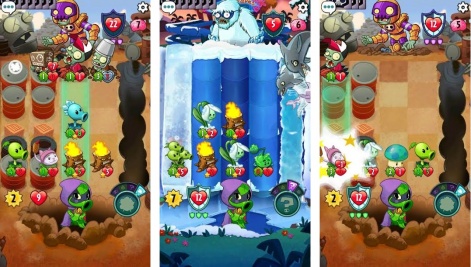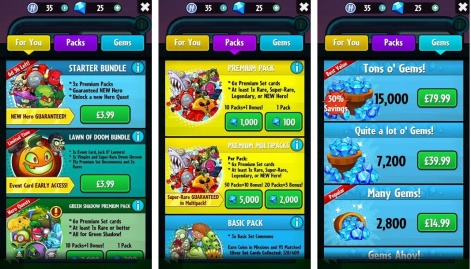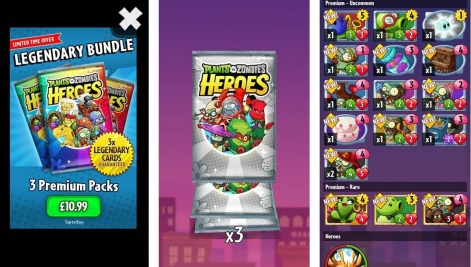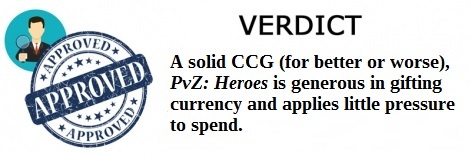Welcome back to the In-App Purchase Inspector - our regular look at free-to-play games from the consumer's perspective.
In each instalment, we consider the incentives or pressure applied to make in-app purchases, their perceived value, the expansion offered by IAPs and the overall value of the experience.
The end goal is to see whether the game makes a good enough case for us to part with our cash, or whether players are content - or engaged enough - to 'freeload'.
This time, we're taking a look at Plants vs. Zombies: Heroes, PopCap's new collectible card game take on the series for a post-Clash Royale world.
A good hand
It's been away from mobile for a while, but Plants vs. Zombies remains an unarguably powerful brand.
Previous mobile entry Plants vs. Zombies 2 bagged 25 million downloads just within the first month of its 2013 launch - a testament to the lasting impact made by the 2010 original.
Tower defence has become a neglected genre, while CCGs have become increasingly popular.
And while it's been absent from mobile in recent times, 2014's console shooter spin-off Plants vs. Zombies: Garden Warfare has picked up the slack by amassing over eight million players. A sequel was released in February 2016.
However, while the public's love for Plants vs. Zombies appears not to have changed, the mobile games market certainly has. Tower defence has become a niche and neglected genre, while CCGs have become increasingly popular.
Indeed, almost any brand you can think of - sometimes five at a time - is now cashing in with its own card-based mobile game.
For a series under pressure to reinvent itself for modern audiences, it's little surprise that PopCap has opted for a CCG Plants vs. Zombies: Heroes rather than a main series sequel.
Stay in your lane
Any game that plays out in portrait, features characters presented as cards and has a battlefield divided into lanes will inevitably lead to comparisons with Clash Royale.
But for Plants vs. Zombies: Heroes, the similarities are almost entirely superficial. This is a much more traditional CCG experience, and a solid one at that.

PvZ already has a varied and likeable cast of characters, which is half the battle for any CCG. There's also a frankly astonishing amount of single player content in Heroes, to the extent that it might even be too much.
That may seem nonsensical, but a slightly less full offering could have left players wanting more rather than being intimidated by the task ahead and churning early.
There's no energy system and, perhaps surprisingly, no video ads.
However, there's a generosity to the game that works in its favour, inviting the player to keep coming back with a solid reciprocity loop and plenty of rewards.
Giving something back
Plants vs. Zombies: Heroes doesn't push the boat out with its monetisation, but this is a good thing. There's no energy system and, perhaps surprisingly given the brand's mass appeal, no video ads.
Coupled with the series' new direction, it perhaps hints that PopCap is looking to appeal beyond the casual player.
There are two currencies: Coins are the soft, and Gems the hard. 100 Coins can be easily earned through play and is enough to buy a Basic card pack containing three common cards.

For the better cards, you'll need Gems. These can be purchased in bundles ranging from 200 for $2.99 to 15,000 for $99.99.
They're also available in pretty sizeable numbers by completing daily quests, including a Mega Quest that yields 100 Gems.
A sizeable number of Gems are available via completing daily quests.
This alone is enough to buy a premium pack, containing six Premium cards and at least one Rare, Super-Rare, Legendary or Hero.
There are also multipacks, going as high as 50 Premium packs (with a 10-pack bonus) for 5,000 Gems - approximately $27 in real money.
Just for you
A major part of a CCG's broad appeal is in the excitement of opening card packs. Indeed, in the case of FIFA Ultimate Team, even watching such an event on YouTube attracts millions.
However, Plants vs. Zombies doesn't quite nail this. Your rewards are presented in a long list, are very small on screen and are categorised according to their value in a way that feels a little dry and unexciting.

One of its smartest moves, though, is a range of retailing options specifically tailored to the player. The store has three columns: Gems, Packs and For You.
This last one offers bundles - many priced in real money rather than in-game currency - geared specifically towards the player.
It's something that goes on anyway in a lot of F2P games, but to make it so explicit makes you feel cared about and catered for - far better than serving you ads for $50 IAPs when you have no intention of spending a penny.
Retailing ramps up once the psychological spending barrier has been crossed.
I bought the Starter Bundle that was recommended for me as a new player - three Premium packs, a guaranteed new Hero and hero quest for $4.99 - and it was replaced atop the list with a Legendary Bundle for $11.99.
I'm confident that this combination of bundles offers genuine value and smart retailing that ramps up once the psychological spending barrier has been crossed will result in many satisfied repeat customers.
No foot wrong
PopCap's CCG debut is a remarkably assured one, then, featuring consistently savvy and generous monetisation.
However, one wonders whether - even with the brand power of Plants vs. Zombies - a move into an increasingly crowded CCG genre is a step in the right direction.
Tower defence may be lying dormant right now, but if any series has the audience to reinvent it as a going concern in 2016 with solid F2P monetisation, it's Plants vs. Zombies.
To reject that opportunity in favour of aping the trends set by more successful developers seems to present a paucity of ambition on PopCap's part, as it begins to follow trends rather than set them.






















